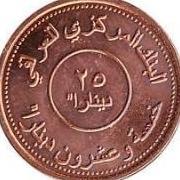
|
-
Posts
8,846 -
Joined
-
Last visited
-
Days Won
21
Laid Back last won the day on July 3
Laid Back had the most liked content!
About Laid Back

Profile Information
-
Gender
Male
-
Location
Hanging between trees
-
Interests
Surf, Yoga, Karate, Meditation, Jogging, Hiking, Camping, Reggae music, Travel, Nature.
Recent Profile Visitors
41,530 profile views
Laid Back's Achievements
-
Iraq has managed to maintain domestic stability, it is indeed facing a looming financial crisis in 2025 due to its heavy reliance on oil revenues, increasing expenditures, and persistent structural weaknesses. Without significant policy reforms, these challenges could have a profound and unprecedented impact on the living and economic conditions of the country
-

Central Bank of Syria "ignores" the Iraqi dinar
Laid Back replied to Tom's topic in Iraq & Dinar Related News
In my opinion the Central Bank of Syria decision to exclude the Iraqi dinar from its official exchange rate bulletin is likely due to a combination of factors related to the economic and political realities of both countries, as well as Syria's own monetary policy objectives. They’re focusing in major reserve currencies. -
The International Monetary Fund (IMF) does not have direct "management rights" over Iraq in the sense of controlling its government or making its policy decisions. However, it does exert significant influence over Iraq's economic policies, particularly when Iraq seeks financial assistance or debt relief. Iraq's government ultimately makes its own decisions, but it often finds it necessary to align its policies with IMF recommendations to secure financial support and maintain international economic credibility.
-
Right on point wciappetta. The Kurdistan Region resists signing the HCL because they believe it would undermine their constitutional rights, economic autonomy, and hard-won self-governance. They seek a law that formally recognizes their right to manage their oil and gas resources within a federal framework, while Baghdad insists on centralized control. This deep seated disagreement has prevented the passage of a national hydrocarbon law for over almost two decades.
-
Thanks for your input Theseus, The relationship between a strong currency and attracting foreign investment is complex and depends on various factors, especially for a developing economy like Iraq. while a strong and stable currency can signal economic health and make certain aspects of investment cheaper, for Iraq, the key is to achieve a stronger currency as a result of broad economic reforms, diversification, and improved business environment, rather than pursuing currency appreciation as an end in itself. The focus should be on creating an attractive environment where the currency's value naturally reflects a robust and growing economy.
-
The National Payment Card system significantly enhances monetary sovereignty in Iraq by allowing the Central Bank of Iraq (CBI) to regain control over its financial system and implement more effective monetary policy to assert greater authority over its currency, monitor financial flows more effectively, and combat illicit activities, all of which are fundamental to strengthening its monetary sovereignty. CBI continues moving forward. Go monetary sovereignty Go stronger dinar
-
In my opinion the sizable fiscal adjustment would likely involve increasing non-oil revenues through revised customs duties and excise taxes controlling the public wage bill, improving public financial management, and addressing corruption. Did you noticed the exchange rate forecast by the IMF for the year 2026 is 1300 dinars per US dollar.
-
https://www.imf.org/en/News/Articles/2025/07/08/pr-25243-iraq-imf-executive-board-concludes-2025-article-iv-consultation?cid=em-COM-123-50416 IMF Executive Board Concludes 2025 Article IV Consultation with Iraq July 9, 2025 Listen with Speechify Washington, DC: The Executive Board of the International Monetary Fund (IMF) concluded the Article IV consultation[1] with Iraq and considered and endorsed the staff appraisal without a meeting on a lapse-of-time basis[2]. Iraq has managed to uphold domestic stability despite regional turmoil and global uncertainty. At the same time, the non-oil economy slowed down in 2024 following a very strong growth in 2023. Inflation has remained subdued amid weaker demand. Financing constraints and lower oil revenues are expected to constrain fiscal spending, taking an additional toll on economic activity. Against a baseline of low oil prices, fiscal deficits and external accounts are projected to deteriorate further over the medium term unless significant reforms are undertaken to increase non-oil revenues, control the public wage bill, and boost non-oil growth potential through an ambitious structural reform agenda. Executive Board Assessment Iraq’s economy is facing considerable headwinds. Iraq's non-oil sector growth slowed from 13.8 percent in 2023 to an estimated 2.5 percent in 2024, impacted by reduced public investment, a weaker trade balance, and financing constraints that led to the accumulation of arrears. Going forward, financing constraints, subdued investment and constrained growth potential are expected to weigh on growth and intensify preexisting fragilities. The large fiscal expansion in recent years has increased Iraq’s vulnerabilities, which are further exacerbated by the recent decline in oil prices. As spending expanded and non-oil revenues stagnated, the oil price required to balance the budget increased to around $84 in 2024, up from $54 in 2020. The financing constraints that emerged in 2024 are expected to worsen this year in light of the oil price drop. Furthermore, risks of sovereign debt stress have risen, calling for urgent policy action. A sizable fiscal adjustment is needed to mitigate macro-fiscal risks, contain liquidity risks and stabilize debt in the medium term. In the very short term, the authorities should review current and capital spending plans for 2025 and limit or postpone all non-essential expenditure. There is also scope to boost non-oil revenues through increases in excises and custom duties. Over the medium term, stabilizing debt would require an additional fiscal consolidation of 1–1.5 percent of non-oil GDP per year. On the revenue side, besides strengthening tax administration, there is scope to increase customs duties and excise taxes, reform personal income tax including by limiting exemptions, and introducing a general sales tax in the medium term. On the spending side, comprehensive public wage bill reforms through limiting mandatory hiring and adopting an attrition rule would yield significant savings. Recent efforts to better target the public distribution system are welcome, but there is scope to further improve targeting and eventually shift to cash-based social safety nets. Finally, it is urgent to reform the public pension system by raising the retirement age and reducing both the accrual and replacement rates. Implementing the proposed reforms could generate fiscal space for increased non-oil capital spending. Crucial non-oil capital expenditures should be protected given the need to expand investment in trade and transportation infrastructure to promote economic diversification; and modernize the electricity sector and develop natural gas resources, which are crucial for enhancing energy security and decreasing reliance on gas imports. Additionally, improving procurement, public financial management, and addressing corruption would boost the effectiveness of any new public investments. Further efforts are needed to absorb the remaining excess liquidity and improve monetary policy transmission. This could be achieved by increasing the issuance of CB-bills, focusing on short-term instruments piloted by the policy rate, adjusting bid size limits, and refining liquidity forecasting tools. Efforts to strengthen the domestic financial system should continue and accelerate. The CBI should be commended for the successful transition to the new trade finance system now fully managed by commercial banks through their CBRs, contributing to a reduction in the spread between the official and parallel market exchange rates. While initial reforms of state-owned banks are promising, a comprehensive restructuring plan addressing nonperforming loans and capital shortfalls is necessary, along with improvements in corporate governance and digital infrastructure. Furthermore, the CBI has started to explore reform options to strengthen the private banking sector. Priority areas are the ownership structure, business model sustainability, regulatory requirements, and elements to support mutual confidence between banks and their customers, such as a credit bureau and stronger deposit guarantee scheme. Alongside these efforts, addressing weaknesses in anti-money laundering and counter-terrorism financing remains paramount. A comprehensive structural reform agenda is vital to unlock growth potential. Estimates suggest that reforms in the labor market, business regulation, financial sector, and governance could double non-oil potential GDP growth in the medium term. Key priorities include enhancing labor force participation, especially among women, by improving education and removing legal barriers, as well as reforming public sector hiring to boost productivity. Improving vocational training programs can align skills with market needs, while simplifying regulations and reducing bureaucratic obstacles will encourage formal economy participation and support private sector development. Electricity sector reform is also critical given how chronic power shortages and inefficiencies weigh on productivity and economic growth. The authorities are encouraged to speed up their efforts to improve billing and collection. Once collection substantially improves, achieving cost recovery will also require electricity tariff increases, with carefully calibrated subsidies targeted to low-income users. These efforts would be supported by further combatting pervasive corruption and addressing governance weaknesses. While progress has been made in implementing the national anti-corruption strategy and improving corruption perception, significant challenges remain. Strengthening accountability in state-owned and private enterprises, complying strictly with EITI standards, enacting a Law on Transparency and Access to Information, aligning legal frameworks with international best practices, and enhancing the independence of NAZAHA are essential measures for effective enforcement and protecting economic rights. It would also enhance the effectiveness of core state functions that are critical to economic activity, such as fiscal governance and financial sector oversight. Data deficiencies persist. Major data deficiencies in Iraq can significantly undermine the robustness of IMF surveillance by leading to incomplete or inaccurate assessments of the economic situation and possibly jeopardizing effective policy recommendations. Building on the numerous CD Iraq has received, it is essential to focus on the most pressing data gaps and incorporate pilot initiatives into disseminated data in a timely manner. Iraq: Selected Economic Indicators, 2024–26 Population: 44.4 million (2024 est.) Per capita GDP: US$ 6,183 (2024) Quota: SDR 1,663.8 million Poverty rate: 23 percent (2014) Main products and exports: Crude oil Key export markets: United States, India, China, South Korea 2024 2025 2026 Est. Proj. Output Real GDP (% change) -2.3 3.1 1.4 Non-oil real GDP (% change) 2.5 1.0 1.5 Prices Inflation, end of period (%) 2.7 2.9 2.9 Central Government Finances Revenues and grants (% of GDP) 39.3 36.9 34.6 Oil revenue (% of GDP) 36.0 33.3 31.0 Expenditure and net lending (% of GDP) 43.5 44.4 43.8 Wages and pensions (% of GDP) 22.0 24.0 24.5 Fiscal balance (% of GDP) -4.2 -7.5 -9.2 Non-oil primary balance (% of non-oil GDP) -59.3 -54.2 -51.8 Total government debt (% of GDP) 47.2 47.2 62.3 Money and Credit Broad money (% change) -4.3 9.6 4.9 Credit to the private sector (% change) 14.3 5.4 8.4 Balance of Payments Current account (% of GDP) 2.0 0.2 -1.9 Foreign direct investment (% of GDP) 0.0 0.0 0.0 Gross reserves (US$ billions) 100.3 91.0 79.2 In months of imports 11.1 11.1 9.6 Total external debt (% of GDP) 20.6 20.8 21.0 Exchange Rate Exchange rate (dinar per US$; period average) 1300 1300 1300 REER (% change, end of period)1/ … … … Oil and Gas Sector Crude oil production (millions of barrels/day) 3.9 4.1 4.1 Crude oil exports (millions of barrels/day) 3.4 3.5 3.5 Average crude oil export price (US$/barrel) 80.6 65.9 62.0 Crude oil exports (US$ billions) 99.2 84.2 79.2 Sources: Iraqi authorities; and Fund staff estimates. 1/ Positive means appreciation. [1] Under Article IV of the IMF's Articles of Agreement, the IMF holds bilateral discussions with members, usually every year. A staff team visits the country, collects economic and financial information, and discusses with officials the country's economic developments and policies. On return to headquarters, the staff prepares a report, which forms the basis for discussion by the Executive Board. [2] The Executive Board takes decisions under its lapse-of-time procedure when the Board agrees that a proposal can be considered without convening formal discussions.
- 19 replies
-
- 11
-

-

-

-

HOT: We Are A Few Hours Away From The Signing HCL.
Laid Back replied to Luigi1's topic in Dinar Rumors
Unable to reach an agreement… No agreement No HCL No salaries. -
Agreed 👍🏼 CBI wants to use the Iraqi dinar in local transactions for many reasons - De-dollarization and monetary sovereignty - Combating Illicit Financial Flows and Money Laundering - Enhancing Financial Transparency and Accountability - Facilitating Economic planning and development - Stabilizing the Exchange Rate - Boosting Confidence in the IQD Work in Progress…. Let’s go Iraq 🇮🇶





.thumb.jpg.97c272fdb311a3a5e823d5b791738eb3.jpg)







